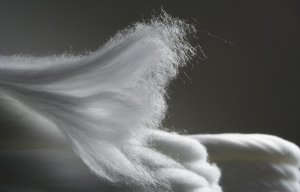
Lenzing plans to acquire its Chinese operation
At this month’s A+A in Düsseldorf Lenzing presented its range of fibres made from renewable wood raw material for corporate and protective clothing. The company reports that its Lenzing FR and Tencel fibres have been very successful this year and are being used to an increasing extent in textiles for corporate clothing. Fibers of made from wood cellulose are rare in professional and protective clothing and in most cases either synthetic or cotton fibres are u

17th November 2009
Innovation in Textiles
|
Lenzing
 At this month’s A+A in Düsseldorf Lenzing presented its range of fibres made from renewable wood raw material for corporate and protective clothing. The company reports that its Lenzing FR and Tencel fibres have been very successful this year and are being used to an increasing extent in textiles for corporate clothing.
At this month’s A+A in Düsseldorf Lenzing presented its range of fibres made from renewable wood raw material for corporate and protective clothing. The company reports that its Lenzing FR and Tencel fibres have been very successful this year and are being used to an increasing extent in textiles for corporate clothing.
Fibers of made from wood cellulose are rare in professional and protective clothing and in most cases either synthetic or cotton fibres are used. Lenzing offers two specialty cellulosic fibres for professional clothing: Lenzing FR, a fibre with an integrated fire resistance agent and Tencel, a functional fibre with optimised moisture management. Lenzing says that the success of its fibres can be explained by their functionality and naturalness. Lenzing admits that the environmental aspect plays an increasingly important role in today’s collections and the arguments of sustainability and environmental friendliness are seen by many manufacturers as a selling point to enable their products to stand out from cheaper imports like those from Asia. Likewise more authorities, organizations and companies attach importance to sustainable products when buying corporate clothing, the company says.
Lenzing FR flame-resistant fibre is already known around the world as a skin-friendly protective fibre. Lenzing says it It is used in many corporate wear applications where it offers optimum protection against different sources of heat. Unique heat insulation properties combined with permanent flame-resistance make Lenzing FR the ‘Heat Protection Fibre’, the company says. According to Lenzing, the overheating of the body during extreme physical exertion at work is a great danger and due to the naturalness of Lenzing FR, the fibre has a good moisture transportation which reduces the risk from life-threatening heat strokes.
Lenzing says that new studies even show that with Lenzing FR the core body temperature is at its lowest due to perfect moisture management. A low core body temperature is a basic pre-requisite for a higher performance and different materials were compared in a series of tests: 100% flame-resistant cotton, 100 % aramid, blends of aramid and Lenzing F® and a blend with Modacryl and cotton. The company says that the winner of the test was quite clearly the aramide/Lenzing FR blend and due to the lower core body temperature, the wearer of Lenzing FR has a higher performance profile. The higher performance amounts to 6 Watts, which Lenzings says means running for one minute longer in practice.
The company says that Lenzing FR is equally a step ahead when it comes to quality. Lenzing FR is the only FR fibre on the market produced using the Modal process and therefore the highest fibre strengths can be obtained and the flame protection is permanently placed inside the fibre. According to Lenzing, conventional FR fibres on a viscose basis lose tenacity as a result of the incorporation and subsequently their protective effect. Lenzing claims that only Lenzing FR offers reliable protection due to its technology.
The cellulose fibre Tencel was presented at A&A for the second time. Two years ago Tencel was mainly shown in the medical field and now it can be found in lots of different applications such as in Corporate Fashion, professional clothing in the gastronomy and service sector and in uniforms. The property profile of Tencel makes the fibre a multi-purpose fibre for a wide field of applications, the company says. Lenzing claims that reduced bacterial growth, the very best skin-sensory properties and an excellent moisture management ensure optimum wearer comfort compared to professional clothing of conventional materials. Tencel is particularly well suited to professional clothing since it is the strongest fibre among the cellulose fibres, Lenzing adds.
The high tenacity profile in the wet and dry condition beats any other cellulose fibre, according to Lenzing and in particular the high tenacity increases the dimensional stability in each end product and makes professional clothing of Tencel particularly durable and long-lasting.
“Tencel can be blended with different fibres and significantly enhances wearer comfort. Not only the wearer comfort is improved but also the eco balance of individual textiles can be positively changed due to the admixture of Tencel. If the share of cotton in professional clothing is replaced with Tencel, this can improve the environmental friendliness. As little as 25 % of Tencel fibre in the textile reduces the amount of cultivable land required for cotton by 25 %. Likewise the water consumption is reduced by 25 %,” a spokesperson for Lenzing said.
Lenzing clearly aims to position itself as a specialist in the field of corporate wear and in a new testimonial campaign it shows people wearing Tencel or Lenzing FR at their place of work.
“They report on the wearer comfort and provide new insight into international working habits. Thus a forester from Austria or a chef from Hong Kong report on Tencel professional clothing at their specific place of work. Each professional application has special demands of the professional clothing used. Lenzing fibres are used all over the world in a variety of applications and completely satisfy various demands depending on the structure and processing,” the company said.

Business intelligence for the fibre, textiles and apparel industries: technologies, innovations, markets, investments, trade policy, sourcing, strategy...
Find out more